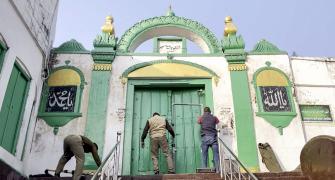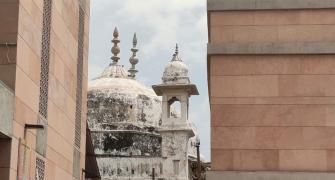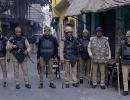Days after Mohan Bhagwat frowned at the resurgence of temple-mosque disputes in the country, the latest issue of an Rashtriya Swayamsevak Sangh-linked magazine has said from Somnath to Sambhal and beyond, it is a battle for knowing historical truth and seeking 'civilisational justice'.

Amid a cacophony over who has insulted Dr B R Ambedkar, even though historical records 'clearly indicate' how the Congress treated the chairman of the Constitution's drafting committee, recent developments in Uttar Pradesh's Sambhal have struck 'a chord with the masses', the editorial published in the latest issue of Organiser noted.
It said the dispute that started with a petition to survey the Shri Harihar Mandir, 'now structured' as the Jama Masjid in the 'historic town' of Uttar Pradesh, is opening up a new debate about various constitutional rights given to individuals and communities.
'Instead of limiting the debate to the Hindu-Muslim question from the pseudo-secularist prism, we need a sane and inclusive debate on the quest for civilisational justice based on truthful Itihasa, involving all sections of the society,' the editorial penned by Prafulla Ketkar, the editor of Organiser, noted.
'From Somnath to Sambhal and beyond, this battle for knowing the historical truth is not about religious supremacy. It is against the Hindu ethos. It is about reaffirming our national identity and seeking civilisational justice,' it said.
RSS chief Bhagwat expressed concern last week over the resurgence of several temple-mosque disputes in the country and asserted that certain individuals, after the construction of the Ram temple in Ayodhya, seem to believe that they can become 'leaders of the Hindus' by raking up such issues.
Delivering a lecture on 'India - The Vishwaguru' at the Sahjeevan Vyakhyanmala (lecture series) in Pune on Thursday, Bhagwat pitched for an inclusive society and said the world needs to be shown that India can live in harmony.
"We have been living in harmony for long. If we want to provide this harmony to the world, we need to create a model of it. After the construction of the Ram mandir, some people think that they can become leaders of the Hindus by raking up similar issues at new places. This is not acceptable," the RSS chief said.
The Ram temple was constructed since it was a matter of faith for all Hindus, he added.
"Every day a new matter (dispute) is being raked up. How can this be allowed? This cannot continue. India needs to show that we can live together," Bhagwat said, without mentioning any particular site.
The editorial in Organiser noted that the story of religious identities in India is not very different from the caste question.
'The Congress tried to duck the caste question, delayed the implementation of social justice and exploited the caste identities for electoral gains. The story of religious identities is not very different,' it said.
'After the painful partition of the motherland on Islamic lines, instead of striving for civilisational justice by telling the truth about Itihasa (history) and resetting the present for a harmonious future, the Congress and Communist historians chose to whitewash the sins of the invaders,' the editorial in the weekly magazine added.
It noted that Ambedkar went to the "root cause" of caste-based discrimination and provided constitutional remedies for it.
'The time is ripe to address this quest for civilisational justice. We need a similar approach to end the religious acrimony and disharmony,' it said.
This approach, based on accepting the truth about history, dissociating 'Bharatiya Muslims' from the perpetrators of 'iconoclasm and religious supremacy', and addressing the quest for civilisational justice, offers hope for peace and harmony, the editorial added.
'Denying such access to justice and the right to know the truth just because some colonised elites and pseudo-intellectuals want to continue with the application of shoddy secularism would encourage radicalism and hostility,' it noted.
The weekly magazine, which published a cover story on the Sambhal dispute in its latest issue, alleged that the Congress 'cabal', by presenting larger-than-life images of bigoted rulers like Mughal emperors Babar and Aurangzeb, gave a false impression to 'Bharatiya Muslims' that they were the rulers here before the British.
'The Muslims of Bharat should realise that they are the inheritors but the victims of barbaric Islamic invasions. Their ancestry is from the diverse sects of Hindus, and therefore, they must reject the ideology of iconoclasm,' it added.









